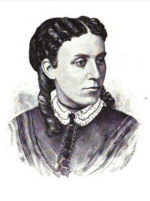Henrietta A. Bingham, Date of Birth, Place of Birth, Date of Death
TweetHenrietta A. Bingham
American writer, editor, preceptress
 Date of Birth: 29-Dec-1841
Date of Birth: 29-Dec-1841
 Place of Birth: Burke, Vermont, United States
Place of Birth: Burke, Vermont, United States
Date of Death: 18-Feb-1877
Profession: writer, poet
Nationality: United States
Zodiac Sign: Capricorn 
About Henrietta A. Bingham
- Henrietta A.
- Bingham (December 29, 1841 - February 18, 1877) was a 19th-century American writer, editor, and preceptress.
- She succeeded Phebe Ann Coffin Hanaford as the editor of the Ladies' Repository and the Myrtle, and was the last editor of the Ladies' Repository.Bingham was born in 1841.
- On January 1, 1843, her mother died, leaving the children to the care of their elder half-sister, Rosalie.
- Bingham was precocious, easily mastering her school studies.
- The summer she was fourteen, she taught school in the Belden district and at sixteen, attended school at South Woodstock, Vermont.
- Many of her school compositions were written in verse, "Farewell Sixteen," "The Island of Dreams," and "My Mother," being of special mention.On leaving the academy, she spent three years in Boston, and in 1864, went to St.
- Lawrence University as preceptress.
- The next year, she wrote the prize story "Mignonette," competing with such writers as Caroline Mehitable Fisher Sawyer and Jane Lippitt Patterson.
- In the spring of 1866, she married Rev.
- Henry Bingham, of Columbus, Wisconsin, who died the following autumn.In 1869, Bingham became editor of the Ladies' Repository, of the Universalist Publishing House of Boston.
- She was marked for succession with Sawyer, Julia Kinney Scott, Sarah Carter Edgarton Mayo, Eliza Ann Bacon Lathrop, and Nancy T.
- Munroe.
- During the five years that she conducted that magazine, she developed a notable literary record.
- Her specialty was verse, but she also demonstrated ability with essay, editorial, short story, and sketch.
- One of her best poems was "L'Envoi," a midnight meditation on the passing year; "The Human Side" and "The Divine Side," were her greatest work, easily placing her in the front rank with writers of her time.
- In 1875, her failing health compelled her to give up writing and return to her old home town, where she died in 1877.
Read more at Wikipedia
See Also
- Famous People's Birthdays on 29 December, United States
- Famous People's Birthdays in December, United States
- Famous writer's Birthdays on 29 December, United States
- Famous writer's Birthdays in December, United States
- Famous poet's Birthdays on 29 December, United States
- Famous poet's Birthdays in December, United States

